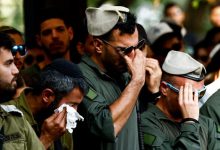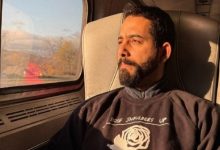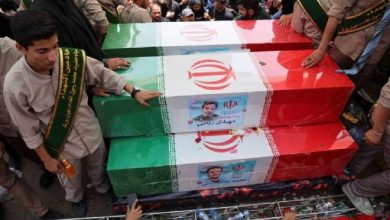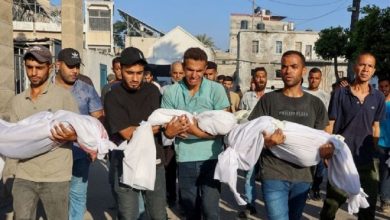Witnessing Tragedy: A Doctor’s Shocking Tale from Gaza’s Frontlines

Watan-A British-Palestinian doctor spoke about shocking differences between his first and second trips to Gaza during the war.
The British-Palestinian doctor, Khalid Dawwas, expressed his astonishment at the significant weight loss among his colleagues and the noticeable deterioration in the Gaza Strip, which was different from what he saw on his first trip, according to a report by the “Middle East Eye” website.
Dawwas said he went on a medical mission to Al-Aqsa Martyrs Hospital in January and returned on a second trip after three months.
Despite the short time between the trips, the difference was stark. Upon his return, he was shocked by the significant weight loss among his colleagues.
When he saw them directly, he asked them, “What happened to you?” adding, “They were different from before, all had lost weight, and I’m talking about between 5 to 20 kilograms.”
He continued, “They were like robots. We tried to tell them we were there to give them a break… But staying at home was worse for them because they were thinking: What should I do? Sit at home and just wait for something to happen?”
Tragic Situation in Gaza
The British-Palestinian doctor, Dawwas, spoke about the situation in Gaza when he returned, saying, “Another major change was the enormous population density.”
He added that the road leading to the hospital, which used to be a rural road, became crowded with tents due to the increasing displacement of Palestinians because of the ongoing Israeli bombardment of Gaza.
He pointed out that Al-Aqsa Martyrs Hospital in central Gaza was also crowded with people, occupying its yards. He said, “In fact, there is no space left, as was the case during my first trip in January. People were everywhere in all the corridors, and their families were lying on the ground between the beds.”
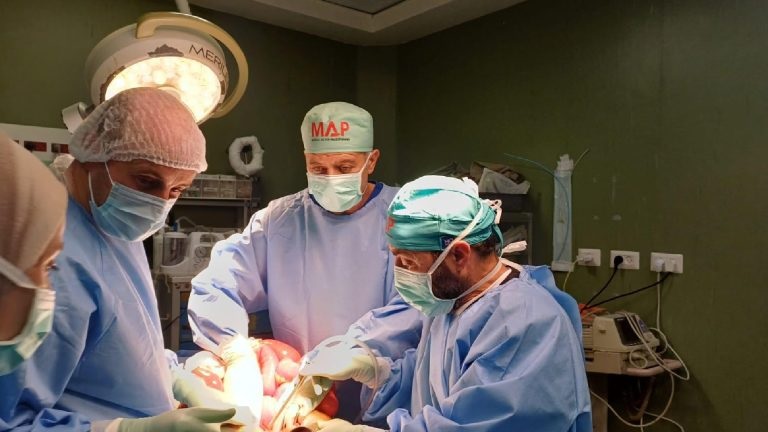
Dawwas treated patients with abdominal and chest injuries, dealing with about 4 to 5 cases per day. He said their injuries were extremely complex, with many suffering from multiple injuries to their body parts, fractures, amputations, abdominal injuries, and chest injuries.
When the Nuseirat refugee camp was heavily bombed by the occupation army between April 11 and 13, 2024, the hospital was filled with cases, most of them children. Dawwas performed surgeries on 20 to 30 patients daily, some simultaneously.
The British-Palestinian doctor mentioned that he performed surgeries on several cases simultaneously and found himself treating cancer patients in advanced stages.
He said, “I dealt with a 45-year-old man who died shortly after my arrival, and I saw a man in his thirties with liver cancer, which is very rare, and there were others with pancreatic cancer, and another with colon cancer that had spread everywhere, so it was too late to do anything.”
He continued, “Maybe I saw a cancer patient in January, but currently, nothing resembles what we used to see.”
According to the report, Dawwas knew he would come to deal with the minimum medical equipment, but during his second visit, there were more medical tools available. However, these were mostly “single-use” devices, and he had to use them “tens of times.”
During his previous trip, he learned to be resourceful by observing his colleagues who adapted to using the scattered tools available to them.
He noted that the level of cleanliness had noticeably deteriorated, with the smell of sewage spreading throughout the hospital.
During his first visit, a rocket hit a building adjacent to the hospital, causing a crater in the ground that led to sewage flowing into the street. When he returned, the sewage had formed a lake.
He said, “Everything in Gaza was contaminated, and everyone was infected, with the smell of pus everywhere.”
Suffering of Gaza Children
Dawwas also witnessed cases of children suffering from pus in the lungs due to chest infections.
He said, “These are extremely rare cases, and you have to wonder if they have tuberculosis, but there is no way to test because there are no necessary laboratories to do so.”

